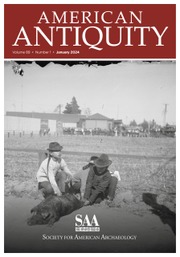Crossref Citations
This article has been cited by the following publications. This list is generated based on data provided by Crossref.
Madsen, David B.
and
Berry, Michael S.
1975.
A Reassessment of Northeastern Great Basin Prehistory.
American Antiquity,
Vol. 40,
Issue. 4,
p.
391.
Yesner, David R.
1978.
Animal bones and human behavior.
Reviews in Anthropology,
Vol. 5,
Issue. 3,
p.
333.
Yesner, David R.
1978.
Culture and nature: Models and manipulations.
Reviews in Anthropology,
Vol. 5,
Issue. 1,
p.
83.
Hauck, Forrest R.
and
Baumann, Richard E.
1982.
Case History — Obtaining Unit Wide Archeological Clearance to Speed Up Federal APD Approvals.
1984.
California Archaeology.
p.
597.
Ambler, J. Richard
and
Sutton, Mark Q.
1989.
The Anasazi Abandonment of the San Juan Drainage and the Numic Expansion.
North American Archaeologist,
Vol. 10,
Issue. 1,
p.
39.
Larson, Daniel O.
and
Michaelsen, Joel
1990.
Impacts of Climatic Variabiity and Population Growth on Virgin Branch Anasazi Cultural Developments.
American Antiquity,
Vol. 55,
Issue. 2,
p.
227.
Young, David A.
and
Bettinger, Robert L.
1992.
The Numic Spread: A Computer Simulation.
American Antiquity,
Vol. 57,
Issue. 1,
p.
85.
Palmer, Jay W.
1993.
Migrations of the Apachean Dineh.
North American Archaeologist,
Vol. 13,
Issue. 3,
p.
195.
Upham, Steadman
1994.
Nomads of the Desert West: A shifting continuum in prehistory.
Journal of World Prehistory,
Vol. 8,
Issue. 2,
p.
113.
Parr, Ryan L.
Carlyle, Shawn W.
and
O'Rourke, Dennis H.
1996.
Ancient DNA analysis of Fremont Amerindians of the Great Salt Lake Wetlands.
American Journal of Physical Anthropology,
Vol. 99,
Issue. 4,
p.
507.
Feathers, James K.
and
Rhode, David
1998.
Luminescence dating of protohistoric pottery from the Great Basin.
Geoarchaeology,
Vol. 13,
Issue. 3,
p.
287.
Carlyle, Shawn W.
Parr, Ryan L.
Hayes, M. Geoffrey
and
O'Rourke, Dennis H.
2000.
Context of maternal lineages in the greater Southwest.
American Journal of Physical Anthropology,
Vol. 113,
Issue. 1,
p.
85.
Stiner, Mary C.
2001.
Thirty years on the “Broad Spectrum Revolution” and paleolithic demography.
Proceedings of the National Academy of Sciences,
Vol. 98,
Issue. 13,
p.
6993.
Cabana, Graciela S.
Hunley, Keith
and
Kaestle, Frederika A.
2008.
Population continuity or replacement? A novel computer simulation approach and its application to the numic expansion (Western Great Basin, USA).
American Journal of Physical Anthropology,
Vol. 135,
Issue. 4,
p.
438.
Scheiber, Laura L.
and
Finley, Judson Byrd
2011.
Obsidian Source Use in the Greater Yellowstone Area, Wyoming Basin, and Central Rocky Mountains.
American Antiquity,
Vol. 76,
Issue. 2,
p.
372.
2020.
Languages in Space and Time.
p.
179.
Reckin, Rachel
and
Todd, Lawrence C.
2020.
Illuminating high elevation seasonal occupational duration using diversity in lithic raw materials and tool types in the greater Yellowstone Ecosystem, USA.
Journal of Anthropological Archaeology,
Vol. 57,
Issue. ,
p.
101119.


